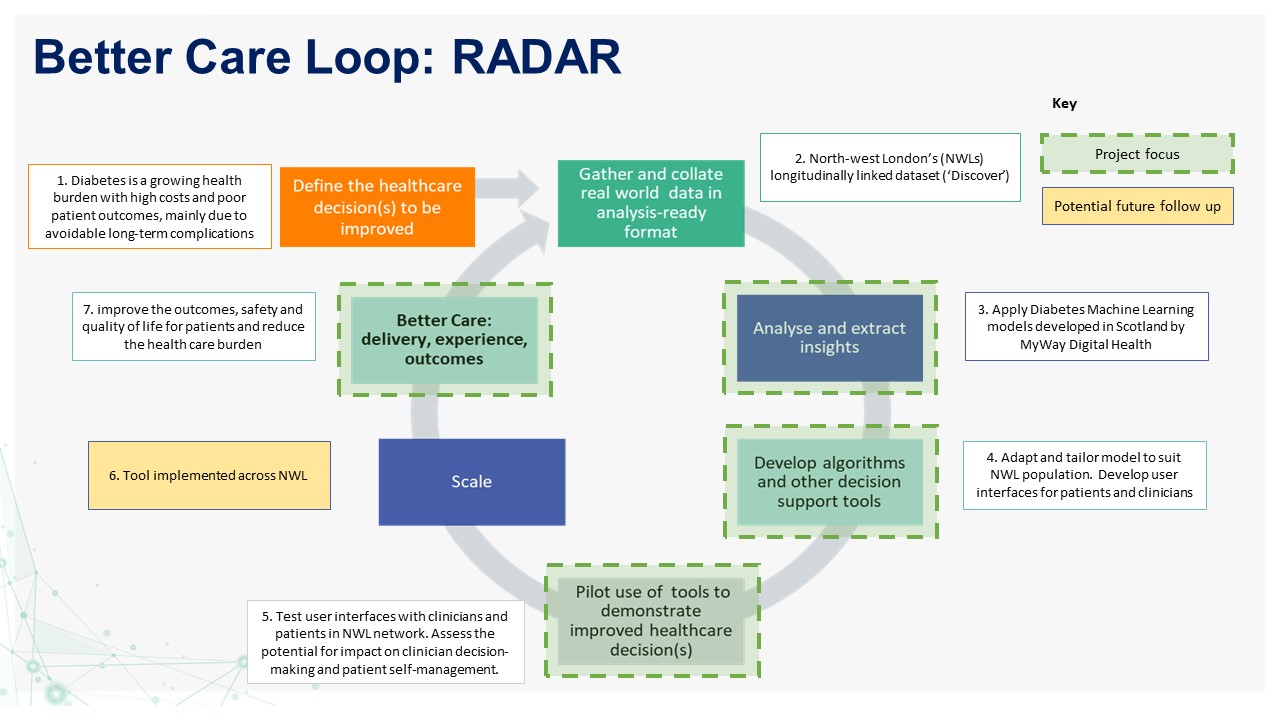Catalyst Project: Reducing the health burden of diabetes with AI-powered clinical decision tools
This project aims to tackle the health burden of diabetes by developing AI-prediction tools to help clinicians and patients make better-informed decisions around management and treatment of the disease

The Challenge
Diabetes is one of the greatest challenges currently facing the NHS, with growing levels of obesity contributing to a large increase in people with type 2 diabetes. Complications from diabetes, including heart attack, stroke, kidney failure and blindness, which have a significant effect on patients’ lives and cause most of the cost and clinical activity associated with diabetes. Evidence demonstrates that assessing the risk of complications and providing targeted interventions to those at highest risk can reduce mortality, complications, and hospital admissions.
The Solution
This project, led by North West London Health and Care Partnership, aims to develop and test data-driven end-user tools that deliver better information visualisation and decision support directly to front-line clinicians and patients. Specifically, it will test the use of risk prediction, powered by a machine learning algorithm, to catalyse change around early intervention, both in terms of medical management and patient self-management.
The team will adapt computer-generated predictions developed by MyWay Digital Health in a Scottish population, to the ethnically diverse North West London population, where type 2 diabetes represents a large part of the disease and cost burden of healthcare.
The Impact and Outcomes
Developing and deploying AI-powered tools for clinicians and patients will provide calculated risk information to help them make better-informed decisions around treatment and self-management.
This clinical decision support could improve quality of life, reduce morbidity, and reduce the healthcare burden through identification and treatment of high-risk individuals. Personalised risk profiling could also be a driver for patient behaviour change impacting on short-term markers such as weight, glucose control, medication adherence, foot care and ultimately reducing complications risk factors.
Using diabetes as an exemplar, this tool will provide the opportunity to use real world data for the improvement of outcomes in patients with other long-term conditions.

Project Team
Project Director: Tony Willis, North West London Health and Care Partnership
Academic Lead: Jack Halligan, Institute of Global Health Innovation, Imperial College London
Industry Lead: Debbie Wake, MyWay Digital Health
Team Members: Will Gilmour, Alex Silverstein (NWLHCP); Toby Hyde (ICHT); Hutan Ashrafian, Saira Ghafur (IGHI); Chris Sainsbury, Doogie Brodie, Dr Scott Cunningham (MWDH); Amanda Lucas, Jonty Heaversedge, Hai Lin Leung, TBC (ICHP); Adam Higgins, Ross Stone (AZ)



